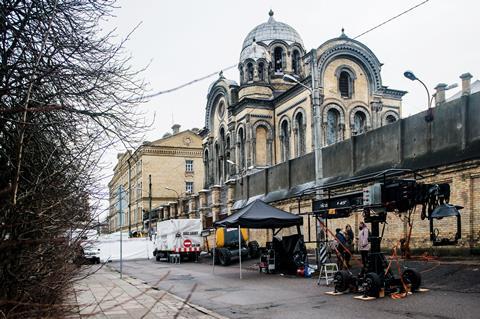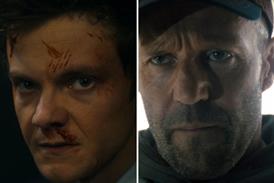
The varied locations of the Lithuania capital of Vilnius have been showcased to international executives this week as part of Meeting Point Vilnius (MPV), the annual audiovisual industry event that takes place during the Vilnius International Film Festival Kino Pavasaris in partnership with Vilnius Film Office.
The tour was organised by the Vilnius Film Office and film commissioner Jurate Pazikaite, was on hand to advise on production and permissions. Jonas Špokas, Baltic Locations founder and CEO and supervising location manager, led the tour.
Lithuania offers a 30% tax rebate for international productions that spend at least €43,000 in Lithuania and incur at least 80% of eligible production costs in the country.
The tour kicked off at Lukiškės Prison, a former prison complex-turned-arts hub in the Lithuanian capital.
“Don’t close a cell door behind you, you’ll get locked in,” said Špokas. “It has happened. Directors, producers, other crew members have found themselves on the wrong side of a locked cell door.”
Built in the early 1900s and closed in 2019, the complex is now home to 250 artists and creators. It also stages concerts and is among Vilnius’ top filming location draws for international filmmakers and producers. It famously hosted an extensive part of the shoot for the fourth season of Stranger Things, which found protagonist Jim Hopper, played by David Harbour, incarcerated in a Russian jail.
“Low- budget indie films have as good a chance as any project to film here if artistic support is needed,” said Špokas, who helps to assess projects looking to film in the facility.
On release, the next stop was a walk around the Unesco- listed Old Town, with its streets, squares and alleys. One of the largest surviving medieval old towns in Northern Europe, it spans 3.59 square kilometres and takes in 74 quarters. It has evolved over centuries and been shaped by the city’s constantly changing cultural influences. It has formed the backdrop of various international film and TV shows including the BBC’s War And Peace and has doubled on screen as Paris, Germany, Moscow and St Petersburg among others.
The tour next visited the central building of Vilnius University, one of the oldest seats of learning in Europe, first established in the 16th century. The buildings have played host to productions including Sky Atlantic/HBO’s Catherine The Great, starring Helen Mirren and Chernobyl.
A prime spot for filming is the university’s hallowed library reading room which holds a host of rare manuscripts in glass cabinets. Filming permits are only granted to productions that deliver a detailed and precise shooting plan due to the fragility of some of the texts, fixtures and fittings.
The university also offers producers the opportunity to film in its enormous late baroque-style Church of St. Johns, St. John the Baptist and St. John the Apostle and Evangelist. Pazikaite pointed out that in a city famous for myriad impressive churches, the university’s was one of the easiest in which to film.
The penultimate stop on the tour was the Writers’ Union Palace. Špokas said he often brings directors to the door of the building – a fairly standard looking doorway in the city – and lets them go in ahead - alone and unbriefed - to discover the building’s neo-baroque style.
“When filmmakers ask for ‘old money’ Lithuania, this is where we bring them,” Špokas said of the building. It boasts ornate mouldings of the furnaces, ornate ceilings, components of blacksmith art and large-scale fireplace surrounds.
He added that because Vilnius is relatively light on traffic, productions could set up at two central locations at once and move seamlessly between the two. Unthinkable in cities like Paris or Berlin or London, he mused.
The tour ended at the cooperative union of Lithuania, a late- modernist governmental building that hasn’t changed since 1986. It is favoured by productions seeking Soviet- era backdrops, politburo offices and a lecture theatre. The building also happens to be home to Baltic Locations, which can provide access to a large roof terrace.
It was particularly popular with visiting Scandinavian dramas, Špokas said.

























No comments yet